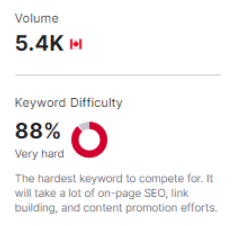
Remember the days of Ask Jeeves and Alta Vista? Or Google’s arrival to the search engine world in 1998? It’s easy to forget that back then Google didn’t have the kind of market share that it does now in 2022. Yahoo was my weapon of choice in the late 90s. I mostly used it to find out useless information about celebrities. It was also a time when there were far fewer search results – and ample opportunity, arguably up until the mid 2000s, to rise through the ranks to the top of SERPs (search engine results pages).
Sometimes, simply releasing a new page or post with in-demand content and little competition was enough to fly you up the charts. But often, practices that would now be deemed as ‘black hat’ techniques such as keyword stuffing, footer links, hidden links, buying links and more were enough to improve your ranking considerably.
We often hear from companies who find it discouraging & disheartening when well-planned and executed SEO content is taking a long time to reap benefits. Common questions we hear are “why is this content on page 1 of search but this isn’t?” or “why is this content taking a lot of time and effort to rank on page 1?”.
Here are 5 common reasons why your content isn’t ranking well:
#1: There’s Too Much Competition

We frequently use keyword difficulty and competitive density interchangeably. This is because keyword difficulty is influenced by the number of websites and domains linking to any given search result. When SEO marketers say “there is too much competition for you to rank on page 1 for that term”, what they typically mean is that the top 10 ranking pages already have a large number of backlinking domains driving traffic to them. Therefore, for your site to get on page 1 will mean it also needs plenty of backlinks.
Semrush has a handy Keyword Difficulty barometer in their Keyword Magic Tool that will show you how hard a term is to rank for (shown below). Ahrefs has a simple formula for calculating keyword difficulty here.

In cases where the competition is too fierce, you should consider changing your focus, finding longer-tail search terms that increase your relevancy and specificity, while lowering the amount of competition.
#2: You Forgot to E-A-T
Trustworthiness, as part of Google’s E-A-T principles, is one of many guidelines Google uses to determine whether the content is valuable to readers. It is part of Google’s algorithm and incorporated into Google’s Search Quality Evaluator Guidelines. The full make-up of E-A-T is expertise, authoritativeness & trustworthiness. Whilst not officially a ranking factor, it does influence search performance by championing high-quality content that is trustworthy based on author expertise, external endorsement (e.g. backlinks from other sites), reputation, and regularly updated, factually correct content. Conversely, pages that misinform, don’t cite sources, don’t provide clear purpose and/or have out of date content will gain a much lower E-A-T rating, and therefore will struggle to rank as well. Learn more about E-A-T in this useful Search Engine Journal article.
#3: You Have Multiple Pages Covering the Same Keyword
Referred to as Content Cannibalization or Keyword Cannibalization, this is when you have more than one page trying to rank for exactly the same keyword. This greatly dilutes performance as search engine crawlers can be confused and conflicted over where best to send users, and therefore both pages suffer in their ability to rank well. Naturally, there will be instances where you have a product/service page and a blog/resources page covering the same topic. However, working with your in-house SEO team or SEO agency to effectively map target keywords to existing & future site URLs is a really important process to mitigate instances of cannibalization.
#4: Your Site Speed is Terrible

Picking an achievable keyword and developing exceptionally well-written, search-optimized content will only get you so far if users struggle to even load your site in the first place. To quote Neil Patel, “site speed matters for SEO.” Want to know the current site speed status quo of your site? Use the PageSpeed Insights tool as a starting point, and pay close attention to mobile performance, as Google operates mobile-first indexing.
#5: You Don’t Use Schema
Not everything you’ll do to get ranked on page 1 will be for the human eye. Schema.org (often called schema) is microdata that you can add to your site’s HTML code (or via use of plugins) to improve the way search engines read and represent your page in search engine results pages (SERPs). This is what helps search engine crawlers more easily identify special pages and content blocks, such as FAQs, products, reviews & more. Use of schema helps content get picked up for rich snippets, such as events, products, reviews and ‘people also asked’ feature blocks on page 1 of search.
To recap, some of the reasons why your content might not be on page 1 of Google are:
- Too much competition
- Low site trustworthiness
- Multiple pages having the same keyword
- Slow site speed
- Absence of Schema markup
These are just some of the many considerations that impact your site appearing on page 1 of search results, but ones that we frequently encounter.
If you need help getting your website on page 1 of Google and the other search engines, let us know in the form below. You can also learn more about our SEO services.
